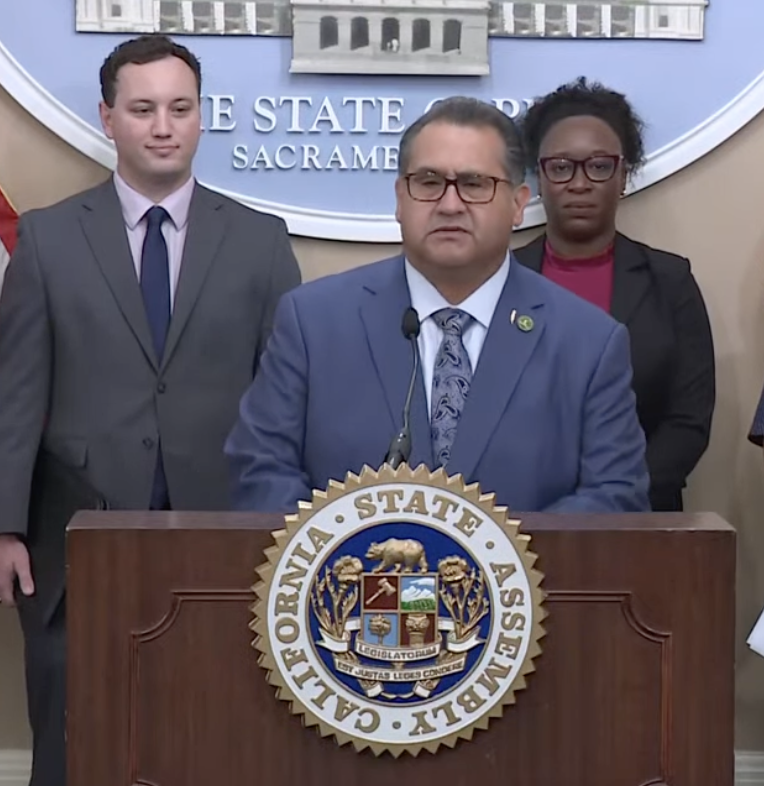
- Details
- By Levi Rickert
California Assemblymember James C. Ramos held a press conference on Wednesday, April 24, 2024, at the California State Capitol in Sacramento to urge schools to use a supportive approach before resorting to suspensions and expulsions for students violating drug-related infractions.
Ramos introduced AB 2711, earlier this year, which would require school districts to adopt appropriate interventions as a first step for troubled students.
Ramos believes California school districts need compassionate and comprehensive approaches to address substance abuse.
“When we suspend or expel a student, they are usually at home and stand to get into greater trouble than if they’re in the classroom,” Ramos said. “An intervention with a counselor who can connect youth to treatment services for alcohol, drugs or mental health services could save a life or change the future for that young person and save that individual from potential incarceration or worse.”
The lawmaker cited California Department of Education data to underscore the troubling numbers of students abusing illegal substances and the uneven application of the punishment:
- 13 percent of 7th graders used alcohol to get drunk – that increases to 52 percent by grade 11.
- 44 percent of 11th graders used cold or cough medicine and,
- 22 percent used prescription pain medications to get high four or more times in their lives.
Ramos also observed that:
- More than 59 percent of drug-related suspensions are of boys,
- More than 83 percent are of socioeconomically disadvantaged students, and
- 83 percent are of youth of color.
Joining Ramos at the press conference were representatives of organizations that support AB 2711.
Adrienne Shilton, vice president of Public Policy and Strategy at California Alliance of Child and Family Services, said research shows that punitive school discipline policies have a disproportionate negative outcome on students who are already facing higher barriers to education.
“The statistics speak volume, over 83 percent of drug related suspensions impacts socioeconomically disadvantaged students,” Shilton said. “The bill recognizes the interconnectedness between student wellbeing and academic success by focusing on support.”
Ramos added that the education code already allows school officials discretion in deciding whether to suspend or expel a pupil who unlawfully possesses, uses, furnishes, or has been under the influence of a controlled substance, alcoholic beverage, or intoxicant or possessed or used tobacco or tobacco products.
“The discretion is not evenly exercised across the state, and we see disproportionate numbers related to these issues. California Department of Education data reveals that almost 60 percent of drug-related suspensions are of boys and more than 83 percent are of disadvantaged students,” Ramos. We can’t afford to keep losing kids without at least giving them the help they need first.”
After the press conference, Ramos participated in a hearing to move AB 2711 through the education committee.
Bill sponsors are the California Academy of Child and Adolescent Psychiatry, California Alliance of Child and Family Services, California Youth Empowerment Network and Children Now.
Ramos is a member of the Serrano/Cahuilla tribe and former chairman of the San Manuel Band of Mission Indians.
More Stories Like This
10 Years of Building Business Dreams for Indigenous WomenIchigo Foundation Awards American Indian College Fund Adult Education Program
Bard College Center for Indigenous Studies (CfIS) Hosts Annual Symposium With Keynote Speaker Miranda Belarde-Lewis on March 9–10
American Indian College Fund Announces Spring 2026 Faculty Fellow Cohort
Navajo Nation Signs $19 Million Diné Higher Education Grant Fund Act into Law
Help us defend tribal sovereignty.
At Native News Online, our mission is rooted in telling the stories that strengthen sovereignty and uplift Indigenous voices — not just at year’s end, but every single day.
Because of your generosity last year, we were able to keep our reporters on the ground in tribal communities, at national gatherings and in the halls of Congress — covering the issues that matter most to Indian Country: sovereignty, culture, education, health and economic opportunity.
That support sustained us through a tough year in 2025. Now, as we look to the year ahead, we need your help right now to ensure warrior journalism remains strong — reporting that defends tribal sovereignty, amplifies Native truth, and holds power accountable.
 The stakes couldn't be higher. Your support keeps Native voices heard, Native stories told and Native sovereignty defended.
The stakes couldn't be higher. Your support keeps Native voices heard, Native stories told and Native sovereignty defended.
Stand with Warrior Journalism today.
Levi Rickert (Potawatomi), Editor & Publisher


